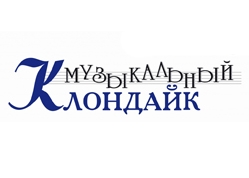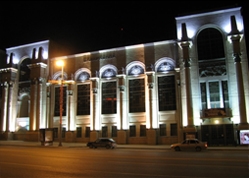Russian Federation Myaskovsky. Dialogues – Myaskovsky and Prokofiev: A Lifelong Dialogue: Maria Ostroukhova (mezzo-soprano), Yury Favorin (pianist), Konstantin Tyulkin (pianist), Boris Zyranov (actor as Prokofiev), Nikolay Rotov (actor as Myaskovsky), Livestreamed on the Virtual Concert Hall from Sverdlovsk Philharmonic Hall, Yekateringburg, 11.3.2021. (GT)
Prokofiev – Four Etudes, Op.2 (1909); Five Songs of Anna Akhmatova, Op. 27 (1917); Precipitato, third movement from Sonata No.7 in B flat major, Op. 83 (1939-42)
Myaskovsky – Eccentricities, No.1, Op.25 (1917-1922); Madrigal – Suite for Voice and Piano, Op.7 (text by Konstantin Balmont) (1908-9); No. 1 and 2 from Six Poems by Alexander Blok, Op.20 (1921); Sonata No.3 in C minor, Op.19 (1920)
This recital, the second of three evenings was devoted to Myaskovsky and his erstwhile friend Sergey Prokofiev and linked with their works for piano and the song cycles. The music captures both composers as they were studying together at the St Petersburg Conservatoire and launching their careers, through to the wartime Seventh Sonata by Prokofiev. The nature of the concert attempted to recreate the musical soirees of the Russian capital in the years before the Great War at a time of enlightenment and a wave of symbolism, mixed with radical concepts of futurism and suprematism in the arts. It was a golden time in Russian art, with an emerging stream of brilliant writers, painters, and musicians. Western Europe witnessed this renewal of Russian art through Diaghilev’s ‘Russian Seasons’ in London and Paris with opera and dance achieving spectacular successes in the theatre and concert hall.
If Prokofiev achieved early fame with his ballets for Diaghilev, Myaskovsky remained in Russia serving as an army reserve lieutenant. Both young composers became associated with the poets of the period, inspired by the diverse literary trends from the dark and quirky religion of Gippius, of Akhmatova, and to the symbolism of Blok and Balmont. The leading symbolists viewed history in terms of the separation of the intelligentsia and the people, and foresaw the activisation of pagan-Asian-Dionysian forces which were present in the Russian masses. Some, though not all, welcomed the final mass upheaval; however were fearful that it might clear the path for an ideal future. These ideas were the stimulation for both Prokofiev and Myaskovsky in this period before the war and the 1917 revolution.
At times, between the musical performances, two actors recreated the friendship of Prokofiev (Boris Zyranov) and Myaskovsky (Nikolay Rotov), in an intimate idiom on either side of the stage, all of which was drawn together by the music journalist Olga Rusanova in an evening of tribute to this unique musical friendship spanning almost half a century. Pianist Yury Favorin is a prize winner of the Queen Elizabeth Competition in Brussels and studied at the Moscow Conservatoire in piano with Mikhail Voskresensky and in composition with Karen Khachaturyan (who was a student of Myaskovsky). Favorin has collaborated with conductors such as Boulez and Marin Alsop. He has recorded several pieces by Myaskovsky and little known works by Roslavets, Popov, Feinberg, Zaderatsky and others. He helped found the ERROR 404 ensemble playing free improvisational music and regularly plays for children’s charity concerts in Austria and Germany.
Favorin opened the musical side of this concert with the Prokofiev Etudes and there was thundering dissonance followed by a lovely melody interrupted by dissonant chords, all brilliantly executed. The second Etude is lyrical, often dream-like and sounding like icy drops falling into a river, reflective and thoughtful; the third Etude evoked bells, yet these were the prelude to a storm of stressful music, with rapid switches between modernism and lyricism; and in the final Etude, we entered into a dark, gloomy world and slowly there arose poetry and lyricism all backed up by terrific virtuosity from Favorin. Myaskovsky’s Eccentricities date from the post-revolutionary period and are among the most eclectic of the composer’s piano pieces. Prokofiev recorded two of the pieces on pianola in Paris. In the first ‘Eccentricity’ we heard a protracted folk melody, beautiful, yet sometimes child-like and naïve, and as brief as Prokofiev’s etudes, this was a strange and brief introduction to the composer’s piano music.
The mezzo-soprano Maria Ostroukhova is a graduate of the Royal College of Music and won the Michael Oliver Prize at the Handel Singing Competition in 2015. Born in Moscow to a musical family, she has performed widely both in the United Kingdom and in Europe in recent seasons, including at the Lammermuir Festival. Her accompanist Konstantin Tyulkin has performed extensively throughout Europe and Russia and studied at the Urals Mussorgsky State Conservatoire with Professor Margarita Yaroslavtseva. Myaskovsky’s Madrigal Suite – based on texts by the symbolist poet Konstantin Balmont – is in five brief settings; Ostroukhova at once gave her full mezzo voice in the fleeting ‘Prelude’, at times creating heavenly singing in the first ‘Romance’, and the idiom was very idealistic in the ‘Interlude’, in the second ‘Romance’, she sang of ‘Your blue eyes’ in a lovingly lyrical song to her erstwhile lover, and in the concluding ‘Postlude’, there was a reprise of Balmont’s verses of a troubled and unhappy soul.
For Prokofiev’s Akhmatova settings, ‘The Sun has filled My Room’ was matched by quirky, spirited and lyrical singing from Ostroukhova; while in ‘True Tenderness’, the intimacy of the poetess’s verses was abundant; in ‘Memory of the Sun’, the singing was touching, yet eccentric; in ‘Greetings’, she sang of coming to meet her lover; and finally ‘The Grey-Eyed King’, opened with the fateful singing of the ‘glory to your mourning death’. There was a significant contrast with the more profound and meaningful Myaskovsky’s Blok settings written in memory of the dead poet. ‘The Full Moon Arose over the Meadow’, contained some beautiful lyricism and touching emotional feelings and reminded me of a painting by the Russian painter Arkhip Kuindzhi depicting a lonely full moon in a still night sky. ‘The Terrible Chill of an Evening’ seemed at first brooding, yet sinister harmonies were heard on the keyboard amid dense chromatic chords, and remarkable opulent singing with the Moscow mezzo-soprano beautifully interpreting this poignantly insightful romance. These two Blok settings by Myaskovsky were the finest pieces of the evening and overall the highlight of the concert.
The Precipato finale from Prokofiev’s Seventh Sonata is among the most brilliant virtuoso pieces written in the twentieth century, and here it was magnificently performed, or perhaps more accurately executed by Favorin, who emphasised that he is a brilliantly gifted musician. It was followed by Myaskovsky’s finest piano piece, the Sonata No.3. It certainly is among his most radical sonatas, and is the piano sonata most often performed, notably by Sviatoslav Richter who played it frequently and made a recording. The opening thunderous bars of the Con desirio segment opened up to a stressful passage displaying the composer’s interest in modernist techniques. Switching constantly between lyricism and dissonance, especially in the second movement, Improvisato-moderato, Myaskovsky delves deeply into the depths with his fluctuating harmonies. Often this sounds like something by one of his favourite pupils Alexander Mosolov, with (in the Stentato, ma sempre agitato) massive ostinato chords and flashes of chromatic music before the work closed with an energetic coda.
In all, this was a memorable concert, and often entertaining for the ‘dialogues’ between the two characters played by the two actors recreating some of the hundreds of letters exchanged between the two composers, at one time raising laughter from the audience when Prokofiev says how much he dislikes Myaskovsky’s Fifth Symphony and then Myaskovsky comically retorting that he doesn’t like it at all, especially the finale! The third and final concert in these Myaskovsky. Dialogues is on 13 March and is available free (click here).
Gregor Tassie


.jpg)

